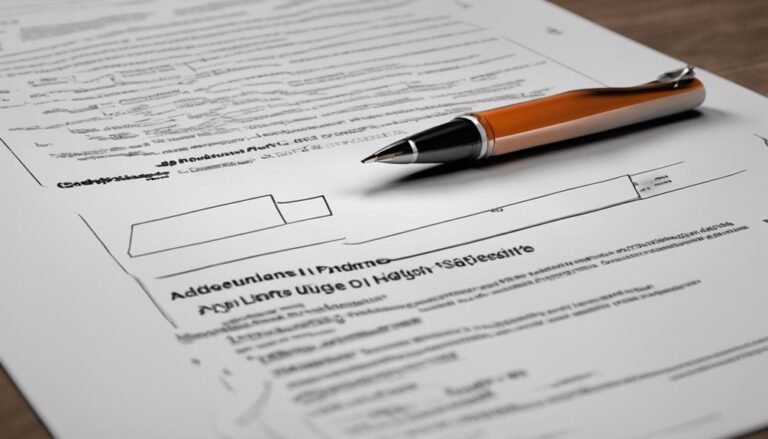Bad Credit: Definition, Examples, and How to Improve
Understanding bad credit is important as it encompasses late payments and low credit scores, posing obstacles for financial prospects. Individuals with a FICO score below 579 fall into the bad credit bracket, facing challenges like high interest rates and limited credit access. Improving credit involves strategic financial practices, timely payments, and debt management. Seeking credit counseling and implementing credit repair strategies are essential for enhancing creditworthiness. Credit scores have a major impact on loan terms and approval processes. Delving further into these aspects can provide valuable insights on managing the complexities of financial management.
Key Takeaways
- Bad credit includes late payments and low scores, limiting financial opportunities.
- FICO scores below 579 indicate bad credit, with high default risks.
- Improve credit by paying bills on time, reducing debt, and managing finances wisely.
- Credit repair involves negotiating debts, consolidating, and seeking counseling.
- Credit scores impact loan terms significantly, affecting interest rates and approval chances.
Understanding Bad Credit
Bad credit, characterized by a history of late bill payments and reflected in a low credit score, poses significant challenges for both individuals and businesses seeking financial opportunities.
Credit counseling plays an essential role in assisting individuals in managing their finances effectively. Through credit counseling, individuals can receive guidance on creating budgets, managing debt, and improving their credit scores.
Additionally, effective financial management strategies, such as budgeting and tracking expenses, are vital in mitigating the negative effects of bad credit.
Examples and Effects of Bad Credit
Instances of poor credit management can have far-reaching consequences on individuals' financial well-being and opportunities. FICO scores below 579 indicate bad credit, with a default risk of around 62% for low-score individuals. Those with fair credit (scores from 580 to 669) face higher interest rates and limited access to credit.
The effects of bad credit extend to difficulties in obtaining loans, facing elevated interest rates, potential job limitations, and housing rejections. Borrowers with lower credit scores may find it challenging to secure favorable financial terms due to the increased default risk associated with their credit profile.
Understanding the implications of bad credit is essential for individuals to take proactive steps to improve their financial standing and access better opportunities.
Improving Credit Score
Enhancing one's credit score entails implementing strategic financial practices to positively impact creditworthiness and access to favorable borrowing terms. When looking to improve credit scores, individuals can focus on credit building techniques and financial responsibility practices. The table below outlines key strategies for enhancing credit scores:
| Credit Building Techniques | Financial Responsibility Practices |
|---|---|
| – Set up automatic payments | – Pay bills on time |
| – Pay down credit card debt | – Keep credit card balances low |
| – Keep unused credit card accounts open | – Regularly check credit reports |
Credit Repair Strategies
Moving from a focus on improving credit scores to addressing credit repair strategies involves implementing specific actions to rectify financial discrepancies and enhance creditworthiness. Debt management plays an important role in this process as it involves negotiating with creditors for payment plans and considering debt consolidation to streamline repayments.
Financial planning becomes essential to avoid falling back into bad credit habits by setting up realistic budgets and monitoring expenses. Seeking credit counseling can provide valuable insights into managing finances effectively and making informed decisions.
However, caution is advised to avoid credit repair scams and refrain from opening multiple new accounts, which could further strain financial stability. By adopting these strategies, individuals can gradually improve their credit standing and work towards a healthier financial future.
Credit Score Impact on Loans
The credit score of an individual or business greatly influences the terms and conditions of loans they can obtain, impacting interest rates and approval likelihood. Higher credit scores typically lead to lower interest rates, whereas lower scores result in higher borrowing costs. Credit scores play a pivotal role in loan approval processes, with many lenders setting minimum credit score requirements to qualify for loans.
Additionally, credit scores have a direct impact on mortgage rates and are significant in determining loan terms. Borrowers with favorable credit scores are more likely to secure loans with better terms, while those with lower scores may face challenges in accessing credit or may encounter higher interest rates on approved loans.
Conclusion
In the intricate web of personal and business finance, the specter of bad credit looms large, casting a shadow over one's financial prospects. Understanding the nuances of bad credit, from its definition to its impact on loans, is important for maneuvering the complex world of credit scores.
By implementing strategic credit repair strategies and improving key factors like payment history and credit utilization ratio, individuals can work towards a brighter financial future.







